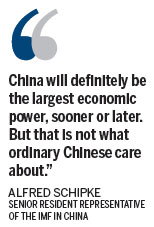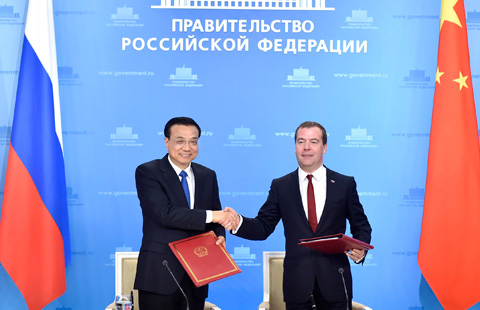Size matters, but so does how it is calculated
Updated: 2014-10-14 07:28
By Zheng Yangpeng(China Daily USA)
|
||||||||
Economy | Zheng Yangpeng
China has overtaken the United States as the world's largest economy this year, according to the International Monetary Fund's latest estimate. But unlike four years ago, when China eclipsed Japan as the world's second-largest economy, this time the news sparked muted reaction and doubts.
Measuring GDP using purchasing power parity, the IMF estimated China's GDP at $17.6 trillion, against $17.4 trillion for the US, ending the latter's position at the top that it held since 1872.
One reason for the doubts is that not everyone agrees about the validity of measuring GDP in terms of PPP.
Domestic media were quick to point to flaws in the PPP calculation, saying this method tends to overestimate developing countries' economic might.
Economists noted that measured by nominal GDP, a more common method of making cross-country comparisons, China's GDP in 2013 was 55 percent of that of the US.
Comparing figures for per capita GDP were even more revealing: China's per capita GDP, standing at $6,807 in 2013, was just 12.8 percent of that of the US.
Even in PPP terms, China's GDP per capita was only 22.4 percent of that of the US.
Some commentators even speculated that the IMF's announcement was meant to "disarm" China by excessively complimenting it. There is no evidence to back up that interpretation. Despite its irrelevance in ordinary people's lives, PPP can help economists understand different nations' economic strengths and overcome exchange-rate distortions.
But even GDP measured in PPP terms is one way to understand the sheer size of the economy, Chinese people know well that the country has many goals beyond the pursuit of GDP.

It is logical that China, with its vast area and the world's largest population, would eventually have the largest economy. But size does not make one great.
"China will definitely be the largest economic power, sooner or later. But that is not what ordinary Chinese care about. At the end of the day, ordinary Chinese care about their incomes," Alfred Schipke, senior resident representative of the IMF in China, said in May after similar economic claims emerged.
Speaking of incomes, China has more reasons to worry than to celebrate. Leaving aside the nation's vast income disparities, household incomes have remained disproportionately small while government income has grown disproportionately large in the composition of GDP.
That has made the transition to a consumption-driven economy move at a glacial pace.
But if income growth accelerates, there is another grave concern: that the country will lose its labor cost advantages while productivity gains stagnate. There are plenty of statistics pointing to just such an outcome - and then there is the rapidly aging population.
The only answer to that, economists said, is more innovation and openness.
Chinese leaders know that, which is why they recently scrapped most of the administrative approvals enterprises were subject to when they made outbound investments. Premier Li Keqiang has reiterated on several occasions that there is only hope for the Chinese economy if 1.4 billion individuals' entrepreneurship and creativity are unleashed.
Much must be done to facilitate that change, and in the age of global competition, slower progress means backsliding. There is little room for self-indulgence.
Contact the writer at zhengyangpeng@chinadaily.com.cn
(China Daily USA 10/14/2014 page15)

 New York celebrates 70th Annual Columbus Day
New York celebrates 70th Annual Columbus Day
 Child bride 'marries' 37-year-old
Child bride 'marries' 37-year-old
 China, Russia sign deals on energy, high-speed railways
China, Russia sign deals on energy, high-speed railways
 Chinese art troupe displays power to overcome obstacles
Chinese art troupe displays power to overcome obstacles
 30 most beautiful counties in China
30 most beautiful counties in China
 Largest drum-shaped building in Hefei sets Guiness record
Largest drum-shaped building in Hefei sets Guiness record
 Nixon Remembered
Nixon Remembered
 Premier Li lays wreath at Tomb of the Unknown Soldier
Premier Li lays wreath at Tomb of the Unknown Soldier
Most Viewed
Editor's Picks

|

|

|

|

|

|
Today's Top News
Alibaba set to expand 'double 11'
DPRK's Kim makes first public appearance in 40 days
HK police vow minimum force to remove protest road barriers
Ferguson protesters struggle to keep focus on slain teenager
Canadian Ebola vaccine begins human testing
Coal taxes could impact market
Shanghai troupe to honor Chinese educator in NYC
High-speed rail deal part of $10b agreements
US Weekly

|

|







